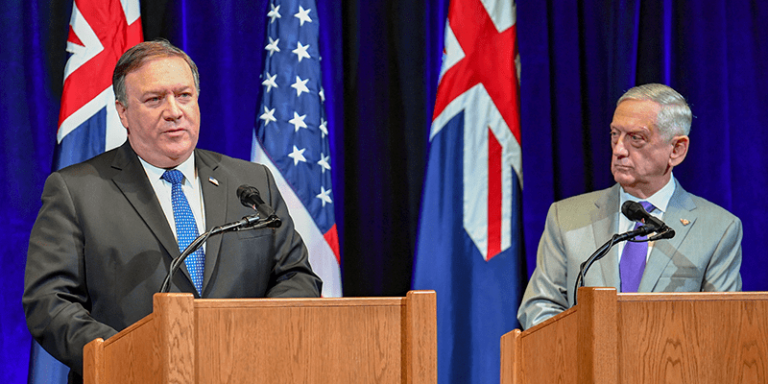
A number of sitting senators demanded a briefing from Trump Administration officials on the White House’s views of US-Saudi Arabia relations, so President Donald Trump dispatched Secretaries of State Mike Pompeo and Defense James Mattis to give a closed-door briefing to any senator who cared to attend. Curiously, the Director of the Central Intelligence Agency (CIA), Gina Haspel, was absent from the meeting. Haspel is the only administration official confirmed to have listened to an audio recording of the murder of journalist Jamal Khashoggi on October 2, and senators told a gaggle of reporters as they left the briefing that Mattis and Pompeo informed them Haspel was left out of the briefing at “the direction of the White House.”
Based on some releases after the briefing, as well as Secretary Pompeo’s op-ed earlier in the day in the Wall Street Journal, Pompeo and Mattis leaned heavily on American-Saudi relations as realpolitik. They recycled old talking points about Saudi Arabia being a good ally and positive force for stability in the region; that Riyadh is crucial to pushing back against Iran; that the United States actually helps mitigate Saudi operational catastrophes in Yemen; and that even if the United States halted its support, the war would carry on regardless. Furthermore, Pompeo said during a post-briefing interview, that there was no direct evidence connecting Saudi Crown Prince Mohammed bin Salman (MbS) to Khashoggi’s murder. But at least one senator promptly contradicted him, saying that the two secretaries did not deny reports that the CIA concluded with high confidence that MbS did order the assassination. That is why it is so confounding that Haspel—the leader of the CIA—would not be there in person to talk about the agency’s assessment and why senators are now demanding to hear from Ms. Haspel herself.
If Trump and his team thought that this briefing was going to dampen the bipartisan outrage among senators, their goal appears to have failed spectacularly. Stalwart opponents of the Saudi-led and US-supported war in Yemen like Chris Murphy (D-Connecticut) were always unlikely to be convinced by Pompeo’s and Mattis’ arguments. But the administration’s attitude may have helped convert senators like Robert Menendez (D-New Jersey), Jack Reed (D-Rhode Island), Joe Manchin (D-West Virginia), Bob Corker (R-Tennessee) and Jeff Flake (R-Arizona) to potential supporters for punishing Saudi Arabia for the Yemen war. Previously, they had opposed punishing the kingdom. Now, the Senate may very well have the votes to proceed to a debate on invoking a provision of the War Powers Resolution (S.J. Res. 54) that Senator Bernie Sanders (I-Vermont) has recently reintroduced after it narrowly lost earlier this year. As things stand, the Senate is scheduled to vote to discharge S.J. Res. 54 (at 4:00 PM) and it looks to have more momentum than at any other time. If it passes, the resolution would move to the floor for debate time, amendments, and an eventual vote on whether to pass it as law. Furthermore, Senators Bob Corker and Lindsey Graham (R-South Carolina) are now demanding to hear from Ms. Haspel, with Graham even threatening to withhold votes for key issues until such a briefing is scheduled.
The Trump Administration likely dealt itself a blow with its attempt at placating a furious Senate today. Refusing to send Haspel makes the Trump team look like it is hiding something, while Pompeo’s and Mattis’ full throated defense of Riyadh makes it look like Washington is the junior partner in a transactional relationship. Senators plainly balked at the secretaries’ performance today, deriding the administration’s talking points as a “3rd grade analysis” and senseless. Luckily for opponents of Washington’s unconditional support for a horrific war and an increasingly erratic leadership in Riyadh, the vote on S.J. Res. 54 could not come at a better time; just hours after the Trump team spurred more senators into action.

